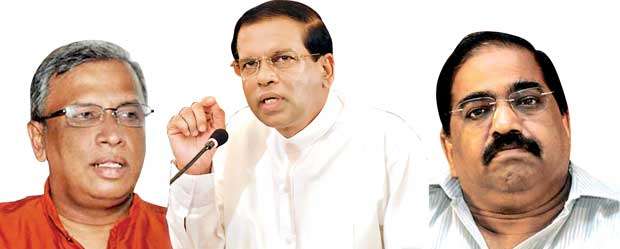11 Dec 2018 - {{hitsCtrl.values.hits}}

 The on-going political and constitutional imbroglio in Sri Lanka could put on the back-burner, all discussion on giving the country a brand new constitution to take care of many pending issues, such as the powers of the Executive Presidency and the question of devolving power to the provinces, a core issue for the minority Tamils.
The on-going political and constitutional imbroglio in Sri Lanka could put on the back-burner, all discussion on giving the country a brand new constitution to take care of many pending issues, such as the powers of the Executive Presidency and the question of devolving power to the provinces, a core issue for the minority Tamils.
According to Lal Wijenayaka, Chairman of the Public Representations Committee of the “Constitutional Assembly” (which comprises all members of the present parliament), a draft of the new constitution had been prepared and distributed to all MPs in October.
But it could not be taken up for discussion because of the political turmoil precipitated by the unceremonious and unexpected sacking of Prime Minister Ranil Wickremesinghe on October 26 by President Maithripala Sirisena.
 There is another question: In case the Supreme Court allows parliament to be dissolved, what happens to the draft new constitution prepared by committees appointed by the dissolved parliament? Will a new parliament have to start the process from scratch?
There is another question: In case the Supreme Court allows parliament to be dissolved, what happens to the draft new constitution prepared by committees appointed by the dissolved parliament? Will a new parliament have to start the process from scratch?
Wijenayaka said that the draft constitution was based on consensus on all issues except two: number 1, the question of keeping, or abolishing or diluting the Executive Presidency and number 2, electoral reform.
In case the SC allows parliament to be dissolved, what happens to the draft new constitution prepared by committees appointed by the dissolved parliament? Will a new parliament have to start the process from scratch?
Apparently, there was consensus even on the touchy issue of power-sharing with the periphery, namely, the provinces. Perhaps this was why the United National Party (UNP) led by Ranil Wickremesinghe reportedly assured the Tamil National Alliance (TNA) that the draft constitution would be presented in parliament before February 2019. On the now controversial 19th Amendment (19A),Wijenayaka said that the contents of 19A were not questioned at any stage because it had diluted the President’s powers and enhanced those of the Prime Minister and parliament by common consent and that too very recently.
Contentious Issues
However, the Executive Presidency and the 19A have become extremely contentious now. These issues have brought the country to a standstill. Sri Lanka is now without a Prime Minister and a Council of Ministers, thanks to a Court of Appeal injunction. A Presidential gazette proclaiming parliament’s dissolution and the ordering of fresh elections has been stayed by the Supreme Court. Parliament may continue to exist or may be dissolved at any time. It will be for the Supreme Court to decide on this but there’s no knowing as to when it will pronounce its verdict. Sri Lankans are truly on tenterhooks.
Given the nature of President Sirisena’s actions from October 26 onwards, the UNP seems to want a total abolition of the Executive Presidency in line with the Joint Opposition (JO)’s 2015 Presidential manifesto.
The Tamil National Alliance (TNA), the Tamil Progressive Alliance (TPA) and the two major Muslim parties also want the Executive Presidency to go given its potential to turn Presidents into dictators and also its dismal record in solving the Tamil question.
Suresh Premachandran of the Eelam Peoples’ Revolutionary Liberation Front (EPRLF) says that though directly elected and sometimes elected with critical support from the Tamil population, Sri Lanka’s Executive Presidents have ignored the Tamils after getting elected. Therefore, the directly elected Executive Presidency has been of no use to the Tamils, he asserts.
TNA spokesman M.A.Sumanthiran says that in a parliamentary system the Executive will need parliament’s support on a daily basis, and Tamil MPs can get multiple opportunities to play an influential role in shaping the decisions of the Executive. However, there are popular forces which are in favour of a strong Executive Presidency such as the Sri Lanka Podujana Peramuna (SLPP) led by former President Mahinda Rajapaksa.
According to the SLPP and its allies, a strong Executive Presidency helps make quick decisions in a perpetually divided polity like Sri Lanka’s. It gives the Executive, the wherewithal to carry out rapid economic development and effectively meet threats to national security emanating from within the country and outside. SLPP members say that terrorists and separatists could not have been defeated and economic regeneration could not have taken place (between 2006 and 2014 end) but for an effective and powerful Executive President like Rajapaksa.
SLPP members say that terrorists and separatists could not have been defeated and economic regeneration could not have taken place (between 2006 and 2014 end) but for an effective and powerful Executive President like Rajapaksa
The Sri Lanka Freedom Party (SLFP) led by President Sirisena is also in favour of retaining the Executive Presidency. It wants the 19A to be tweaked to give the Executive President the teeth he now lacks. Much of his power had been taken away by the Independent Commissions set up under the 19A.
Some of the issues relating to the Executive President are now before a seven-judge bench of the Supreme Court and its verdict is eagerly awaited not only to get out of the present predicament but also to secure guidance on what could be done in regard to the draft constitution.
A key issue before the court is whether the Presidential act of dissolving Parliament is justifiable. Related to this is the scope and nature of the legal immunity granted to the President when his actions are challenged in court. While it is agreed that a litigant can challenge the executive and administrative actions of the President, can he challenge a political action such as the dissolution of parliament? Is it not a prerogative of the President to summon, prorogue and dissolve parliament? How can dissolution of parliament accompanied with an order to hold fresh elections be seen as being “undemocratic” when it recognizes the sovereignty of the people?
The counter argument to this is that there is nothing anywhere in the constitution to suggest that the framers intended the President to have the freedom to act in violation of constitutionally entrenched clauses. The 19A had clearly set limits to Presidential power.
Unbridled discretionary powers given to a President will only give rise to populism and misuse of power for aggrandizement. It will replace constitutionalism. The stability of States and political systems is critically dependent on constitutionalism. Mature democracies either circumscribe discretionary powers or do away with them altogether.
Also, Sirisena’s act of dissolving parliament can be deemed a violation of the people’s will as expressed in the August 2015 parliamentary elections, even if fresh elections are ordered to secure a fresh mandate. The distinction between a political act and an administrative act has been made to prevent “judicial overreach”. But in a case like the one facing Sri Lanka today, the political act of dissolving parliament can be seen as a violation of the constitution since it explicitly breaks specific articles of the constitution. No political act which violates the constitution can be condoned or kept out of the purview of the Supreme Court which is the final arbiter in constitutional matters.
Admittedly, the drafting process of the 19A was chaotic. It was not debated in a cool and calm manner. It did not adhere to contemporary norms of transparency and public consultation. But ultimately, there was a consensus and a compromise.
Sirisena’s act of dissolving parliament can be deemed a violation of the people’s will as expressed in the August 2015 parliamentary polls, even if fresh elections are ordered to secure a fresh mandate
The 19A neither took the Rajapaksa nor the Wickremesinghe line, the former wanting most Presidential powers retained, and the latter wanting as little of them as possible. The compromise came about when the Supreme Court insisted that any fundamental change in the 1978 constitution should be subjected to a two thirds majority as well as a referendum.
But the nett result of all this is that Sri Lanka has neither an Executive Presidency nor a Westminster style parliamentary democracy. This has thrown the doors open to conflicts of the type it is facing now.
30 Nov 2024 5 minute ago
30 Nov 2024 2 hours ago
30 Nov 2024 5 hours ago
30 Nov 2024 6 hours ago
30 Nov 2024 9 hours ago